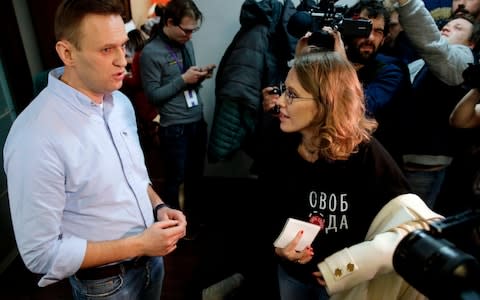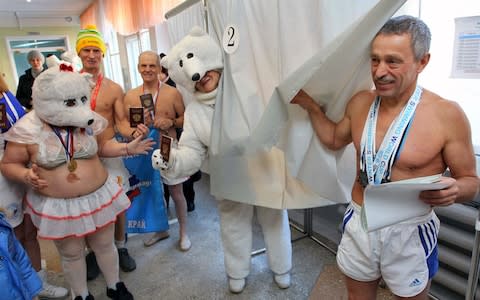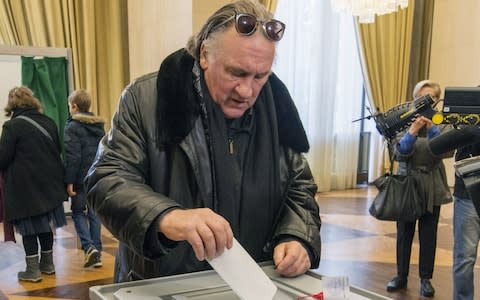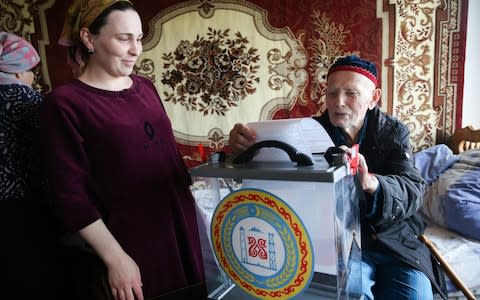Vladimir Putin dismisses claims Russia was behind Salisbury attack after winning fourth term as president

Victorious Vladimir Putin lashed out at accusations Russia was responsible for poisoning Sergei Skripal, a former double agent, as he celebrated winning a fourth presidential term on Sunday night.
Mr Putin, who thanked his supporters outside the Kremlin for his victory, dismissed British allegations that Russia was responsible for the attack by saying it was "total nonsense" that someone would have allowed such an attack before the election.
He said: "Russia does not possess such agents. We have destroyed all our chemical arsenals under control of international observers."
Despite a campaign troubled by lack of interest and an opposition boycott, Mr Putin had collected 76 per cent of votes with four fifths of the ballots counted, according to the central electoral commission.
Although his victory was never in doubt, a poorer showing than the 64 per cent he got in the 2012 presidential election could have called into question the continuation of his 18-year rule.
Another six-year term will allow Mr Putin, 65, to rival Joseph Stalin as the country's longest-serving leader.

On Sunday evening, Mr Putin thanked supporters outside the Kremlin for his victory.
“I see in this an acknowledgement of what was done in recent years in very difficult conditions, I see in this the trust and hope of our people that we will work just as intensely, just as responsibly and even more successfully,” he said.
Opposition leader Alexei Navalny, 41, who was barred from running due to a politicised embezzlement conviction, called a voter boycott and recruited 26,000 electoral observers to catch any attempts to inflate turnout.

The WCIOM exit poll placed turnout at 63.7 per cent, just below the 65 per cent the Kremlin was reportedly seeking to match the 2012 results.
At a school polling station in Odintsovo, an industrial city of 140,000 in the Moscow region, electoral commission member Sergei Nekhayonok described pressure from the authorities to “raise turnout”.
The state-owned factory where he works had been sending him and other employees door-to-door for the past two weeks to encourage people to vote, he told The Telegraph.
“Each district administration gets out the vote,” he said. “I don't know if this is normal or not.”

Mr Putin's campaign spokesman Andrei Kondrashov offered a tongue-in-cheek thank-you to Britain for the diplomatic row over Mr Skripal's poisoning, which he said had created a “turnout we couldn't have dreamt of ourselves”.
“When Russia indiscriminately and without evidence is accused of something, all that the Russian people do is come together around a centre of power. The centre of power today is Putin,” he said.

While communist candidate Pavel Grudinin placed a distant second, his reported 11.2 per cent marked an improvement over his poll numbers. Perennial nationalist candidate Vladimir Zhirinovsky received 6.7 per cent.
Among those who voted was Gérard Depardieu, 69, the ever controversial French film star who was awarded Russian citizenship by Mr Putin in 2013. He cast his ballot at the Russian embassy in Paris.
Russians in Ukraine were blocked from voting by police and protesters as annexed Crimea held its first-ever Russian presidential vote.

Reports of falsifications threatened to tarnish Mr Putin's resounding victory, however. Mr Navalny said the officially reported turnout exceeded what his network of electoral observers had counted by 25 per cent in the Altai republic, 18 per cent in the Perm region and 12 per cent in the Kemerovo region.
Online polling station cameras captured many blatant violations. In Chechnya, where Mr Putin won 99 per cent of the vote in 2012, a man was seen casually stuffing ballots as he greeted acquaintances. In the Primorsk region, a woman tried to surreptitiously shove a pile of ballots into an urn.
Прелесть какая, посмотрите. Вброс. Приморский край, город Артём, УИК номер 326. pic.twitter.com/PJlStzW23B
— Alexey Navalny (@navalny) March 18, 2018
The regional electoral commission nullified the results at a polling station in the Moscow suburb of Lyubertsy after ballot stuffing was caught on camera.
Meanwhile, at a polling place in Kemerovo, which is known for suspiciously high turnouts, a woman obscured the camera's view with balloons as electoral workers began pouring ballots out on a table for counting.
At a polling station in Kemerovo, one of the regions that always has impossibly high results, an electoral worker puts balloons in front of the camera just as employees start counting the ballots on the table @mediazzzonahttps://t.co/htJXEGX55dpic.twitter.com/VjKvKzIWkP
— Alec Luhn (@ASLuhn) March 18, 2018
Student Gleb Matveyev, 20, one of about 50 Navalny volunteers who observed the vote in Chechnya, said the polling station he was monitoring in Grozny reported 69 per cent turnout with only 100 “extra votes”.
“We smashed to dust the theory that there is 99 per cent turnout in Chechnya,” he said.

But involuntary voting likely had the greatest effect on results. Independent electoral monitor Golos received complaints that state employees had been forced to the polls under threat of firing and voters had been bussed to polling stations en masse.
As voting came to a close in Moscow, Ksenia Sobchak, a former reality TV star who ran for president in what some saw as a Kremlin ploy, came Mr Navalny's headquarters and asked him on a live YouTube stream to join with her to form a new opposition party. She reportedly received less than 2 per cent of the vote.
Mr Navalny refused, accusing her of taking money to run for president and calling her “part of the lying, falsifying scheme that didn't let me into the election”.
Russian election - share of the vote
He also accused her of withdrawing permission for his observers to work in her name in the Kemerovo region, which Ms Sobchak said was caused by a mix-up with RFERL journalists.
Despite a stagnant economy, average incomes are far higher now than when Mr Putin first took office. His approval rating has not dipped below 80 per cent since the annexation of Crimea in 2014.
“I'm for Putin, I love him, he's a strong president,” said pensioner Nina Guseva, 70, as patriotic songs played at the entrance to the Odintsovo polling station. “There's no war, there's food in the stores. Now if they would just raise our pensions a little …”
Russian election turnout
Some voters supported Mr Putin against what they called unfair accusations by the West, including over the Skripal case.
"If a person is confident in the Russian state, then what other countries do won't change his confidence," Odintsovo electoral worker Alexadner Alyoshkin said.
"If you are a patriot you will go vote," said Yury Afanasiyev, 47, when asked why he had bothered to vote for Mr Putin in such a one-sided election.
But many others appeared apathetic, especially young voters.
“There's no point in voting because the result is already clear,” said student Alexei Kursky, 19, as he waited for a suburban train.
Many of the tens of thousands of volunteer electoral observers held vigil late into the night as the ballots were counted and the results reported to the district electoral commission.
"There were violations in all previous elections," said Yury Gorokhov in Odintsovo, "so you don't know if it will be clean."
Additional reporting by David Chazan in Paris

